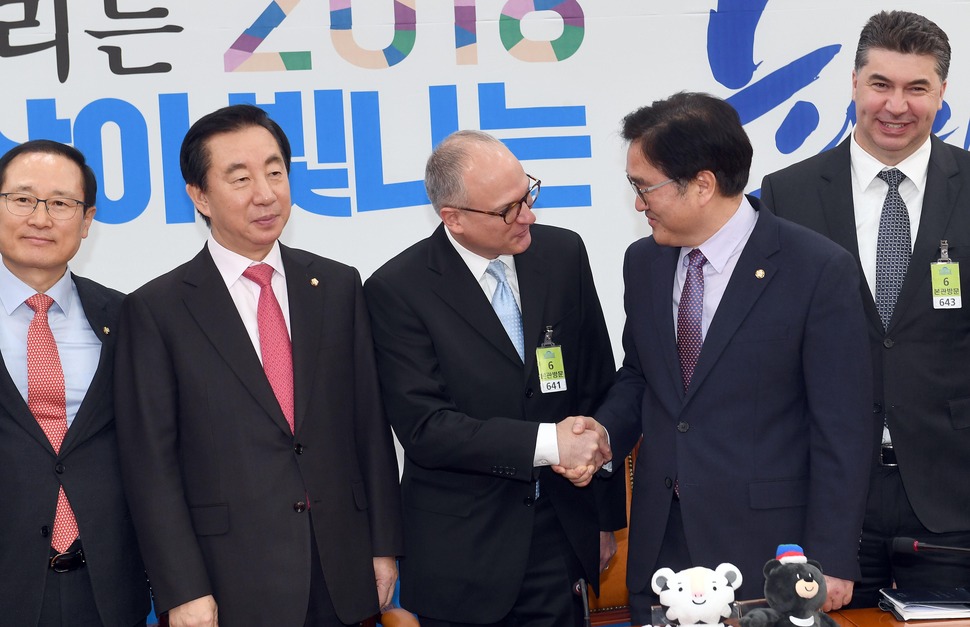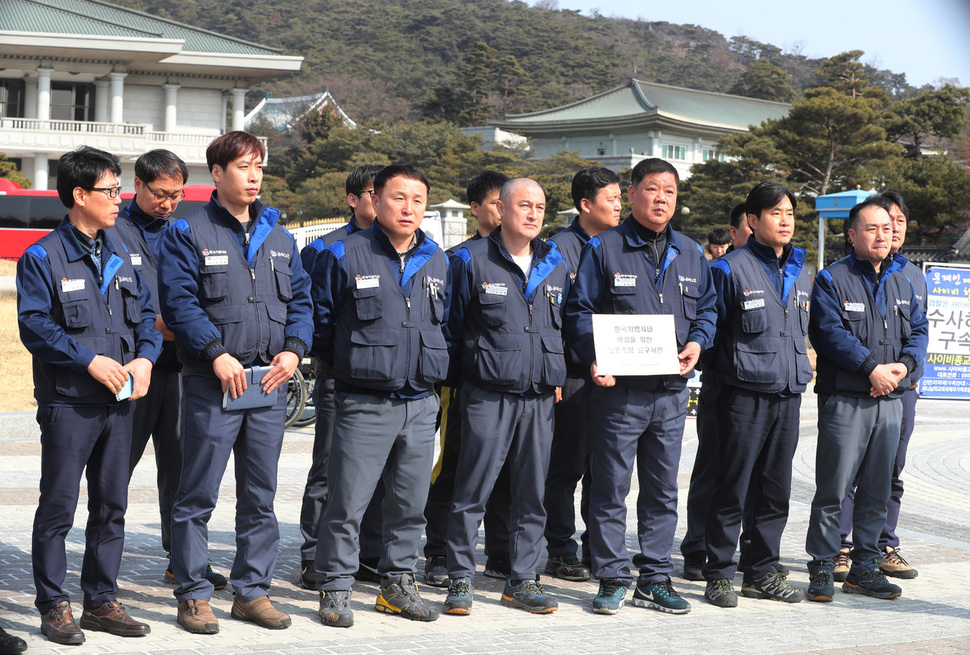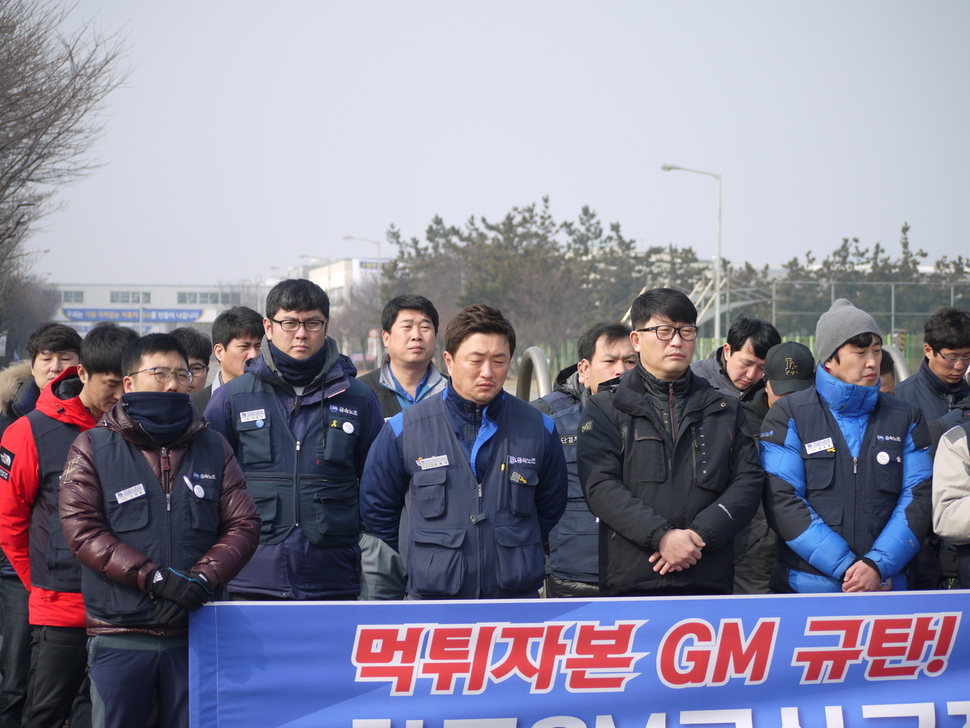Posted on : Feb.21,2018 17:45 KST
Modified on : Feb.21,2018 17:52 KST
 |
|
GM International President Barry Engle meets with members of the ruling and opposition parties during a visit to the National Assembly on Feb. 20. From left are Hong Young-pyo, Democratic Party lawmaker and head of the, “GM Korea Taskforce,” Kim Sung-tae, floor leader of the Liberty Korea Party, Engle, and Woo Won-shik, floor leader of the Democratic Party. (Yonhap News)
|
On Feb. 20, Barry Engle, president of GM International, visited South Korea and held a series of meetings with politicians from both the ruling and opposition parties. Just before the Lunar New Year, the GM corporate headquarters announced that it was planning to close the Gunsan factory of GM Korea and asked the South Korean government for assistance.
“GM is prepared to play its role to fix GM Korea, and it’s asking for help from GM Korea’s labor union and from the South Korean government. I will discuss negotiations with the South Korean government later, at a more appropriate time. The details are confidential,” Engle told reporters after the meetings. Engle reportedly said during the meetings that the company plans to deploy two new cars at factories in Bupyeong, Gyeonggi Province and Changwon, South Gyeongsang Province.
Engle’s visit to South Korea appears to be part of GM’s attempt to squeeze assistance from the South Korean government. He is also planning to meet officials from the Ministry of Trade, Industry and Energy and the Korea Development Bank. The South Korean government must make clear to GM that no support will be available until the company has shown that it is serious about its normalization plan. A number of GM’s actions thus far give reason to doubt that it is committed to normalizing operations.
 |
|
Lim Han-taek, leader of the GM Korea branch of the Korean Metal Workers’ Union (third from right in the front row) stands with other union members in front of the Blue House on Feb. 20 to demand a resolution to the crisis sparked by GM’s decision to close its factory in Gunsan, North Jeolla Province. The GM Korea workers’ union is demanding that the government take action to guarantee the employment status of the company’s 300,000 workers. (by Baek So-ah, staff photographer)
|
On the grounds that it is reorganizing its global business operations, GM reduced GM Korea’s export volume without allocating a new car to compensate for this. Furthermore, GM Korea’s debt has grown because of its irregular transactions with the GM corporate headquarters. We learned that the GM main office collected US$380 million of its loans to GM Korea that expired last month. If GM Korea is really shutting down the Gunsan factory because of a cash crunch, why would GM be removing hundreds of millions of dollars in funding from GM Korea? This even raises suspicions that the company is angling for a “hit and run” after pocketing financial aid.
Words alone aren’t enough for GM to convince the parties concerned that it is committed to normalization. What is most critical is releasing a concrete and feasible mid- to long-term investment plan and measures to improve management transparency. This will require a strict due diligence of the business. Despite this, GM has not been cooperating with the Korea Development Bank’s request for the submission of related documents.
If GM wants to demonstrate its sincerity, it should start by relenting on its negotiations deadline of the end of February. After announcing its plans to shutter the Gunsan Factory on Feb. 13, Engle said, “Some meaningful progress must be achieved by the end of February, when GM will be making a major decision for the next phase.” It is physically impossible to carry out a due diligence of the business and to create a normalization plan within this timeframe.
 |
|
Members of the North Jeolla branch of the Korean Confederation of Trade Unions demonstrate outside of the GM Factory in Gunsan to condemn the financial “hit-and-run” tactics of GM International on Feb. 20. KCTU is accusing the country of withdrawing from the Korean market after pocketing financial aid from the government. (by Park Im-keun, North Jeolla correspondent)
|
During a press conference on the same day, the GM Korea labor union promised to “share the pain,” presuming that the GM corporate headquarters comes up with a plan to save the factory. If GM offers a specific roadmap for investing in new cars, a plan for expanding export volume, and a way to convert the entire loan (about 3 trillion won; US$2.97 billion) into equity, the union said, it would make concessions where possible to create a win-win situation. At the same time, the union also insisted that “the government must not be blackmailed by GM into providing an unconditional infusion of public funds.”
In the end, the first step toward resolving this situation is for GM to offer a sincere plan for normalizing management. That’s a principle to which the South Korean government must firmly hold during the negotiations, and it’s something that GM should be fully aware of as well.
Please direct questions or comments to [english@hani.co.kr]











